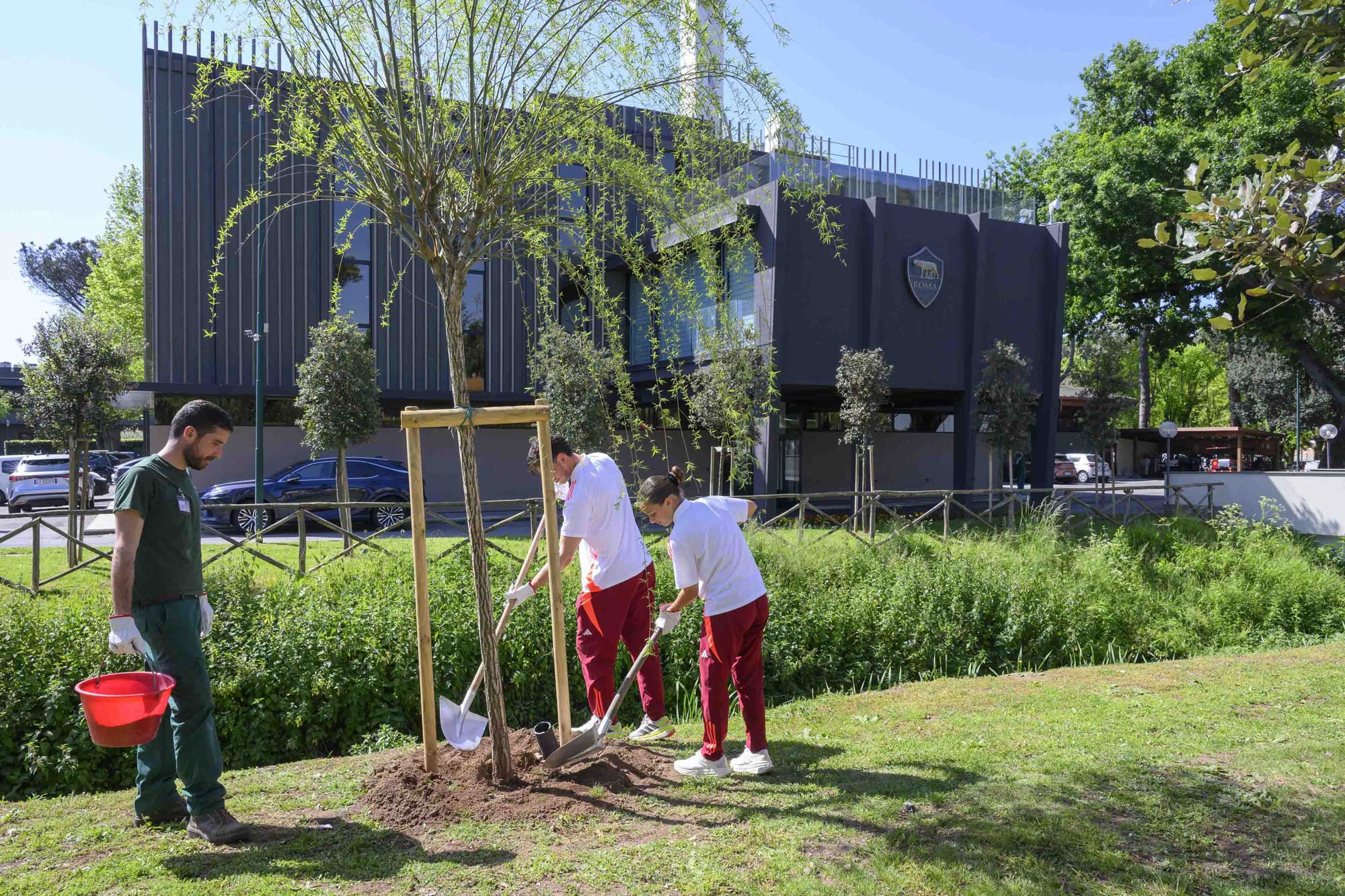
Environmental Sustainability
The Club, which has been working with UEFA to pilot the key aspects of the European Football Sustainability Strategy 2030, 'Strength Through Unity', since 2023, has initiated a positive way forward on environmental issues in the Community and within its own Sports Centre through numerous initiatives:


AS Roma and Ogyre together to clean the Ocean
AS Roma and Ogyre join forces to protect what truly matters: our Planet.
Together, they aim for a concrete and measurable goal: removing 30,000 kg of plastic from the Ocean, thanks to the daily efforts of fishers’ communities in Italy, Brazil, and Indonesia.
This initiative stems from the desire to turn passion for sport into tangible action for the environment. Not just words, but real results: removing 30,000 kg of waste means eliminating the equivalent of nearly 70,000 footballs from the Ocean. A concrete number that reminds us how powerful the union between sport and environmental commitment can be.
Follow our mission. Together, we can turn our red and yellow passion into real change for the Planet.


The "Score a Goal for the Earth" project
Through the ‘Score a Goal for the Earth' project, the Club will participate in the redevelopment of the capital's green areas by contributing to the planting of three new trees for every goal scored by Giallorossi players until the end of the 2024/2025 season.
The new trees will be planted in the parks managed by the regional organisation RomaNatura, with which the project was conceived.


Installation of an Urban Vegetable Garden
Planted on an area of 2,960 square metres on land adjacent to the Centro Sportivo Fulvio Bernardini owned by the AS Roma group, AS Roma's urban vegetable garden guarantees a harvest of approximately 1,200 kg of vegetables every year, which are used in the Centro Sportivo restaurant to serve the first team, Youth Sector, and employees through a true farm-to-table experience.
Produce is harvested weekly, diversing the types of vegetables picked in order to ensure the freshness, variety and quality of the food being brought to the table. The urban garden is also used for environmental education activities for Youth Sector children attending the Liceo Scientifico Sportivo inside the Centre, as well as children from other schools in the capital.


"Food for the Community" project
The Club is engaged in the recovery of surplus food from catering services in the hospitality areas of the Olympic Stadium. To date, thanks to collaborations first with ACLI and then with Caritas, more than 5 tons of food have been recovered and distributed, and then donated to aid associations, parishes, and foster homes in the Capital.
The “Food for the Community” project also includes the donation of part of the weekly harvest from the Urban Garden at the Fulvio Bernardini Sports Center to the Empori della Solidarietà (food banks) run by the Diocesan Caritas of Rome to support families in the Capital who are experiencing food poverty.


Adhesion to the UN 'Sports for Climate Action Framework' and 'Football for the Goals' initiatives
AS Roma has strengthened its commitment to sustainability and climate action by adhering to the initiatives called for by the United Nations to halve emissions by 2030, through five key principles:
- Undertake systematic efforts to promote greater environmental responsibility
- Reduce overall climate impact
- Educate for climate action
- Promote sustainable and responsible consumption
- Advocate for climate action through communication
The Club has also officially joined Football for the Goals, a United Nations tool that provides a platform for the global football community to commit to and support the Sustainable Development Goals.


Responsible Management of Water and Renewable Energy
The club has launched a series of initiatives at all its sites to promote responsible water use and optimise energy consumption.
Water dispensers have been introduced in the club's offices to reduce the use of plastic bottles. Additionally, the grass training fields and ornamental greenery are irrigated with groundwater supply in compliance with current regulations, while for the synthetic playing fields a totally natural infill made of recyclable organic material has been chosen.
In terms of electricity, AS Roma relies on supplies from 100% renewable sources, and has also implemented charging stations for the staff's electric vehicles. To reduce consumption and environmental impact, the facades of the premises at the sporting centre have been restyled by retrofitting thermal insulation to the main building, and LED lighting has been introduced. The process of restyling these facades allows the Club to save 96 MegaWatts of energy per year.


Reforestation project
In collaboration with RomaNatura, 120 new trees have been planted inside the Fulvio Bernardini Sports Center, as an integral part of the green redevelopment of the facility that began some months ago. This activity will be followed by others in the coming years which will allow a doubling of the number of different species on site. The use of native species such as holly oak, suitable for activities within sports facilities, helps to reduce allergenic factors and increase the biodiversity of the vegetation.


Ongoing collaboration with RomaNatura regional body
AS Roma is working closely with regional body RomaNatura, both to redevelop Centro Sportivo Fulvio Bernardini, and to promote initiatives to rehabilitate the local coastline through the voluntary work of its employees - and also to raise awareness about environmental issues for younger generations through dedicated events such as that organised in collaboration with the 'Muovi Roma' association at Villa Mazzanti and Monte Mario during the Christmas period.

© 2018-2025 Soccer S.r.l. – EU VAT IT09305501000 - all rights reserved. The AS Roma names, logos and artwork are registered or unregistered trademarks of Soccer S.r.l. All other trademarks may be the property of their respective holders.
 Tickets
Tickets
 Shop
Shop





























